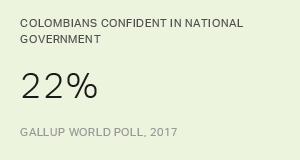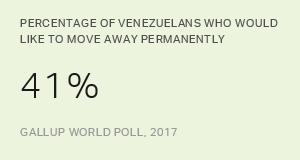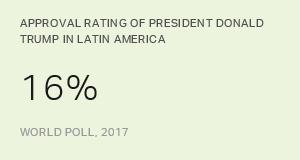Story Highlights
- Colombians rate their lives worse than in the last election year
- Nearly half (47%) say local economic conditions getting worse
- Confidence in national government at record-low 22%
WASHINGTON, D.C. -- Colombians are struggling on multiple fronts ahead of the presidential election this weekend, but their declining life satisfaction provides some of the best evidence that they are ready for change. Shortly after the last election in 2014, the majority of Colombians (51%) rated their lives positively enough to be considered thriving, but they have rated their lives worse every passing year since.
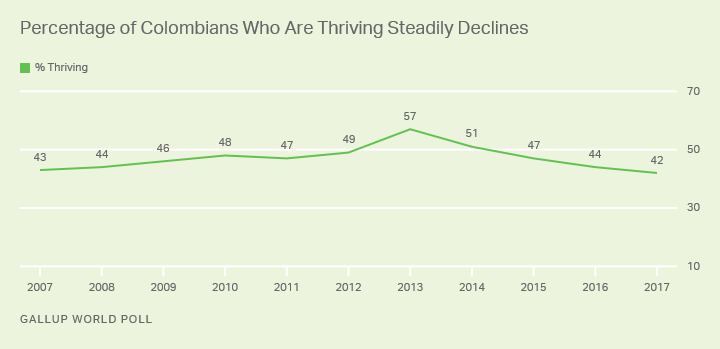
For the past decade, Gallup has asked residents of Colombia to evaluate their lives on the Cantril Self-Anchoring Striving Scale, where "0" represents the worst possible life and "10" represents the best possible life. Gallup classifies people as "thriving" if they rate their current lives a 7 or higher and their lives in five years an 8 or higher.
Recent research by London School of Economics academic George Ward shows that how people feel about their lives influences how they vote in elections. In fact, he believes measures such as these may be better predictors of elections than questions about how people feel about the economy.
But Colombians' views of their economy, too, suggest they are ready for something different. While Colombia's economy was able to withstand shocks better than those of other oil-exporting countries in the region, economic growth has slowed, expanding only 1.8% last year and 2% the year before. Colombians seem to be feeling this. The 47% who reported last year that their city economy is getting worse is the highest on record in the past decade.
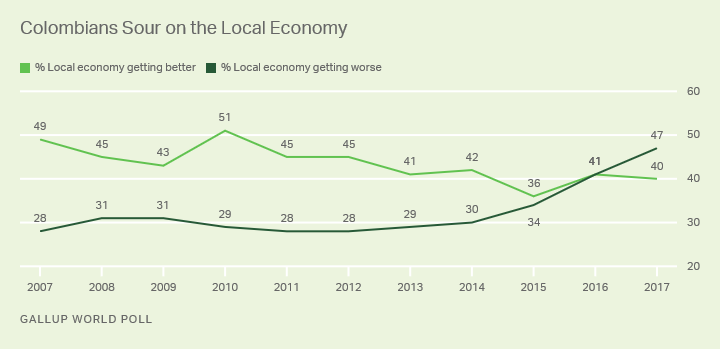
Still, Colombia's economy is actually doing better than many of its counterparts in the Latin American and Caribbean region. As a whole, the region's economy contracted in 2015 and 2016 and grew by about 1% in 2017. Brazil, Argentina and especially Venezuela are all suffering from their own economic troubles. By contrast, Colombia is currently in the accession process to join the OECD, a club of wealthy countries, which should improve its attractiveness to international investors if accepted.
Colombians Place Little Faith in Government
Whoever takes the helm of Colombia's government will need to grapple with the sluggish economy but also work to restore Colombians' failing faith in their leadership. In 2017, Colombians' confidence in their national government dropped to a record-low 22%. The percentage who say corruption is a widespread problem throughout their government remains mired near 90%.
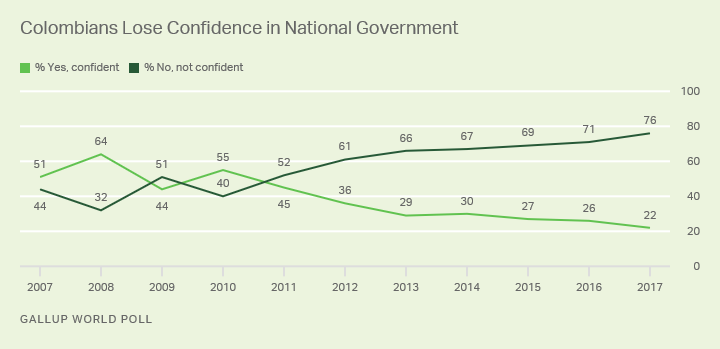
Implications
While it is uncertain who Colombia's next president will be, it is clear that whoever is elected will represent a significant shift for the country. The current president's party, the Party of the U, is not fielding a candidate. The leader in the polls is Sen. Ivan Duque, who represents the right-of-center party, the Democratic Center. This party was founded in 2013 by Colombia's former President Alvaro Uribe to oppose the current president's policies.
Second in the polls is Gustavo Petro, a former mayor of Bogota. He represents the leftist Humana party, and promises a more socialist agenda. However, he has previously been sympathetic toward Venezuelan President Nicolas Maduro, which could hurt him as Colombia continues to feel the effects of Venezuela's collapse next door.
More than 1 million Venezuelan refugees have flooded into Colombia as their home country's crisis worsens. This promises to put considerable strain on Colombia's already-stretched resources in the coming years.
Another contentious issue is implementing the FARC accord ratified at the end of 2016. While the international community praised the deal, and Colombia's President Juan Manuel Santos was awarded the Nobel Peace Prize, Colombians remain highly skeptical of it.
At a time when they are facing deteriorating living conditions, Colombians are in no mood to offer carrots to former guerilla fighters. The FARC failed to win any seats in the March parliamentary elections, and Duque has vocally opposed the accord.
Survey Methods
These results are based on face-to-face interviews with 1,000 adults, aged 15 and older, conducted in Colombia from June 16-July 5, 2017, in Spanish. For results based on the total sample of national adults, the margin of sampling error is ±3.6 percentage points at the 95% confidence level. The margin of error reflects the influence of data weighting. In addition to sampling error, question wording and practical difficulties in conducting surveys can introduce error or bias into the findings of public opinion polls.
For complete methodology and specific survey dates, please review Gallup's Country Data Set details.
Learn more about how the Gallup World Poll works.
